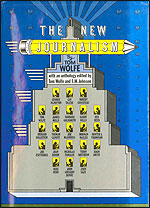
Writing the Book
How does a journalist make the journey to author? A variety of paths and potential pitfalls are here for you to learn from. Authors of memoirs, novels and nonfiction narratives write frankly about the ups and downs. These days the topic of books can’t be discussed without mentioning online platforms and self-publishing so you’ll also hear from the individuals behind The Atavist and Byliner as well as an author who brought his book back from the dead via print-on-demand. If you have a publishing (horror or success) story you’d like to share, please drop us a line at nreditor@harvard.edu.
I'm addicted to news. I believe in the watchdog role of the Fourth Estate and that our democracy and way of life depend on a free press. When I teach journalism at the University of Arkansas, I preach these sentiments to my students. But these are not the reasons I got into journalism. I wanted a place to write.
As an undergraduate at the University of Nebraska, I thought I might be a novelist. I was an English major with a real thing for Ernest Hemingway and F. Scott Fitzgerald and all of Gertrude Stein's "lost generation." Then, through the mortifying experience of a sophomore fiction writing class, I was confronted with the possibility that I had no imagination. I was a terrible dreamer.
Still, I felt I was a writer who should be out there learning things and writing things. My words should find an audience. Call me naïve or idealistic or a narcissist; it is probably a mix of all those things. But after joining the student newspaper and after many years of working as a professional journalist and after earning a master's in fine arts in nonfiction writing, I figured out that this urge to be out there wasn't mine alone. It penetrated every newsroom I worked in. Seems like it's a basic requirement for the job.
And that's good. The industry is blessed with people who should be out there; the kind of people who can track the glimmer of a story in the shadows and cracks, who can wiggle in, push it out, find the sources, the facts, the narrative, and expand it into a piece that shines a blinding light on a subject. Those stories won't be told without good reporting. But they don't attract an audience without good writing.
Journalism is where good writers go who want to make a living at their craft. Name a bunch of novelists who aren't holding down a second job. What about poets? The best are transcendent. Shakespeare was a poet. So was Goethe. When was the last time you bought a book of poetry?
It's no surprise then that so many reporters become book authors, too. In fact, at many magazines and national newspapers, such as The New York Times, it's the new normal. The question for folks like me, reporters who fancy themselves writers, is: Why the hell haven't you written a book? The pressure is on.
It used to be enough just to leap from market to bigger market, from beat to bigger beat, swinging your way up the food chain until you get to what used to be called the "destination paper"—The New York Times, Los Angeles Times, Chicago Tribune, The Washington Post, or maybe a national magazine. With print crumbling, the old paths to success are being dismantled.
Emerging from this rubble is each reporter as a brand—an authority, a producer of multimedia and social media, an all-media entrepreneur. And that even includes the granddaddy of media—the book.
Literary Aspirations
It's not as though journalists haven't traveled a similar road before. In a few of my journalism classes, we read Tom Wolfe's seminal treatise on literary journalism in his 1973 anthology "The New Journalism." In it, he writes about the newsrooms of the 1960's and, in particular, the dark fate of feature writers who regarded newspapers as a "motel you checked into overnight on the road to the final triumph." The triumph was the novel, at a time when the novel reigned supreme.
Wolfe writes about how some reporters actually pulled it off. There was, he tells us, a newsman named Charles Portis, who left his plum London bureau gig to return to Arkansas to write in a fishing shack. He emerged with two novels, the latter being "True Grit." Wolfe, practically screaming, writes, "A fishing shack! In Arkansas! It was too goddamned perfect to be true, and yet there it was. Which is to say that the old dream, the Novel, has never died."
Literary aspirations have long stirred lowly news reporters. But Wolfe and others were responsible for re-casting that old dream. In newspapers and magazines they shrugged off the conventions of newswriting and swiped whatever they could from fiction writing. Scene-by-scene construction, extended dialogue, multiple points of view, and as Wolfe calls it, a person's "status life," the possessions, the speech, the mannerisms, the customs, habits, and all the things that go into the way people "express their position in the world, or what they think it is or what they hope it is to be."
Naturally, some of those articles became books. Wolfe, Gay Talese, and Jimmy Breslin all published literary nonfiction books, which Wolfe hailed as displacing the novel, a form he regarded as having given up on reality. The list of journalists-cum-authors since then is immense. And they're not writing novels. They're writing best-selling nonfiction, such as Mark Bowden (The Philadelphia Inquirer), author of "Black Hawk Down: A Story of Modern War"; Ron Suskind (The Wall Street Journal), author of, most recently, "Confidence Men: Wall Street, Washington, and the Education of a President"; Isabel Wilkerson (The New York Times), author of "The Warmth of Other Suns: The Epic Story of America's Great Migration"; Steve Coll (The Washington Post), author of "Ghost Wars: The Secret History of the CIA, Afghanistan, and Bin Laden, From the Soviet Invasion to September 10, 2011." Their names and titles go on and on.
When I ask my news and editorial students why they're drawn to journalism, the vast majority say "writing." Delivering the news/informing the public is a distant second. This is not to say that both ideas aren't important to them, but there are a lot of ways to deliver the news. These kids want to write. And the power of the book still holds sway over young journalists, just as Wolfe noticed.
Students in my Literature of Journalism class marvel at the power of the nonfiction book, noting how temporary and fleeting newspaper stories are in comparison. "There's no skimming in a nonfiction book," said one student. "You really engage the reader." Another noted: "When I read a news article, I take away what it was about. When I read literary journalism, I think about the issue but also the way it was presented. I give the author credit." It was "hard to go back to fiction now that I know the real world can be written about so vividly," one said, while another made the point that writing books can liberate a journalist from depending on newspapers as a source of income, no small consideration in this day and age (though there is no guarantee this will happen, either). "It's pretty hard to ignore the romance of writing a book," one student observed, and in doing so captured the allure the book has held for generations of journalists.
The Author's Itch
I've wanted to write a book since I was in college. That's why I went to George Mason University for a master's of fine arts in writing. I also worked for the Arkansas Democrat-Gazette, The Washington Post, and U.S. News & World Report. While I found these jobs satisfying, I also felt the nagging notion that all this was just prep work for something bigger. That feeling has only grown since I started teaching. I teach nonfiction books. I study them, praise them, and pick them apart, and as I do so, I often wonder what's holding me back from writing one.
What, I ask myself, prevents me from joining the class of the new elite, the reporter as author? Now it's not even enough to write a book. It has to be the book—important, and showing people something they've never seen before. It has to be a towering display of reporting and a show pony of storytelling. It has to be … genius.
On good days I like to think that it's because I haven't found my topic yet. But that's a cop-out. What is really going on is that all this study of books, as a student and as a professor, has driven home how hard writing a book is to do well. And the bar just keeps getting higher. Consider the true-life storytelling from Laura Hillenbrand, the frontline war narrative produced by Dexter Filkins, or the character-driven historic accounts by Erik Larson.
I know how hard this is to do. I was a research assistant for memoirist and biographer Beverly Lowry and studied under another noted biographer, Meryle Secrest. I've written magazine cover stories and other in-depth reports. It is not easy. I know the obsession it requires, the mania it can induce, and the sacrifices that have to be made. Knowing all of this is the braking mechanism that stops me from going after the big prize, from attempting to joining the ranks of those journalists that Wolfe so vaunted, the ones that "wiped out the novel as literature's main event."
I always felt Wolfe was writing to his fellow reporters in that essay, reassuring us that writing a great story—the great book—has nothing to do with having a big imagination. It's about finding a story worth telling, then using the right tools to tell it. I know he's right. Someday I will be a reporter-cum-author. Just as soon as I find my topic.
Bret Schulte is an assistant professor in the journalism department at the University of Arkansas and a freelance writer.
As an undergraduate at the University of Nebraska, I thought I might be a novelist. I was an English major with a real thing for Ernest Hemingway and F. Scott Fitzgerald and all of Gertrude Stein's "lost generation." Then, through the mortifying experience of a sophomore fiction writing class, I was confronted with the possibility that I had no imagination. I was a terrible dreamer.
Still, I felt I was a writer who should be out there learning things and writing things. My words should find an audience. Call me naïve or idealistic or a narcissist; it is probably a mix of all those things. But after joining the student newspaper and after many years of working as a professional journalist and after earning a master's in fine arts in nonfiction writing, I figured out that this urge to be out there wasn't mine alone. It penetrated every newsroom I worked in. Seems like it's a basic requirement for the job.
And that's good. The industry is blessed with people who should be out there; the kind of people who can track the glimmer of a story in the shadows and cracks, who can wiggle in, push it out, find the sources, the facts, the narrative, and expand it into a piece that shines a blinding light on a subject. Those stories won't be told without good reporting. But they don't attract an audience without good writing.
Journalism is where good writers go who want to make a living at their craft. Name a bunch of novelists who aren't holding down a second job. What about poets? The best are transcendent. Shakespeare was a poet. So was Goethe. When was the last time you bought a book of poetry?
It's no surprise then that so many reporters become book authors, too. In fact, at many magazines and national newspapers, such as The New York Times, it's the new normal. The question for folks like me, reporters who fancy themselves writers, is: Why the hell haven't you written a book? The pressure is on.
It used to be enough just to leap from market to bigger market, from beat to bigger beat, swinging your way up the food chain until you get to what used to be called the "destination paper"—The New York Times, Los Angeles Times, Chicago Tribune, The Washington Post, or maybe a national magazine. With print crumbling, the old paths to success are being dismantled.
Emerging from this rubble is each reporter as a brand—an authority, a producer of multimedia and social media, an all-media entrepreneur. And that even includes the granddaddy of media—the book.
Literary Aspirations
It's not as though journalists haven't traveled a similar road before. In a few of my journalism classes, we read Tom Wolfe's seminal treatise on literary journalism in his 1973 anthology "The New Journalism." In it, he writes about the newsrooms of the 1960's and, in particular, the dark fate of feature writers who regarded newspapers as a "motel you checked into overnight on the road to the final triumph." The triumph was the novel, at a time when the novel reigned supreme.
Wolfe writes about how some reporters actually pulled it off. There was, he tells us, a newsman named Charles Portis, who left his plum London bureau gig to return to Arkansas to write in a fishing shack. He emerged with two novels, the latter being "True Grit." Wolfe, practically screaming, writes, "A fishing shack! In Arkansas! It was too goddamned perfect to be true, and yet there it was. Which is to say that the old dream, the Novel, has never died."
Literary aspirations have long stirred lowly news reporters. But Wolfe and others were responsible for re-casting that old dream. In newspapers and magazines they shrugged off the conventions of newswriting and swiped whatever they could from fiction writing. Scene-by-scene construction, extended dialogue, multiple points of view, and as Wolfe calls it, a person's "status life," the possessions, the speech, the mannerisms, the customs, habits, and all the things that go into the way people "express their position in the world, or what they think it is or what they hope it is to be."
Naturally, some of those articles became books. Wolfe, Gay Talese, and Jimmy Breslin all published literary nonfiction books, which Wolfe hailed as displacing the novel, a form he regarded as having given up on reality. The list of journalists-cum-authors since then is immense. And they're not writing novels. They're writing best-selling nonfiction, such as Mark Bowden (The Philadelphia Inquirer), author of "Black Hawk Down: A Story of Modern War"; Ron Suskind (The Wall Street Journal), author of, most recently, "Confidence Men: Wall Street, Washington, and the Education of a President"; Isabel Wilkerson (The New York Times), author of "The Warmth of Other Suns: The Epic Story of America's Great Migration"; Steve Coll (The Washington Post), author of "Ghost Wars: The Secret History of the CIA, Afghanistan, and Bin Laden, From the Soviet Invasion to September 10, 2011." Their names and titles go on and on.
When I ask my news and editorial students why they're drawn to journalism, the vast majority say "writing." Delivering the news/informing the public is a distant second. This is not to say that both ideas aren't important to them, but there are a lot of ways to deliver the news. These kids want to write. And the power of the book still holds sway over young journalists, just as Wolfe noticed.
Students in my Literature of Journalism class marvel at the power of the nonfiction book, noting how temporary and fleeting newspaper stories are in comparison. "There's no skimming in a nonfiction book," said one student. "You really engage the reader." Another noted: "When I read a news article, I take away what it was about. When I read literary journalism, I think about the issue but also the way it was presented. I give the author credit." It was "hard to go back to fiction now that I know the real world can be written about so vividly," one said, while another made the point that writing books can liberate a journalist from depending on newspapers as a source of income, no small consideration in this day and age (though there is no guarantee this will happen, either). "It's pretty hard to ignore the romance of writing a book," one student observed, and in doing so captured the allure the book has held for generations of journalists.
The Author's Itch
I've wanted to write a book since I was in college. That's why I went to George Mason University for a master's of fine arts in writing. I also worked for the Arkansas Democrat-Gazette, The Washington Post, and U.S. News & World Report. While I found these jobs satisfying, I also felt the nagging notion that all this was just prep work for something bigger. That feeling has only grown since I started teaching. I teach nonfiction books. I study them, praise them, and pick them apart, and as I do so, I often wonder what's holding me back from writing one.
What, I ask myself, prevents me from joining the class of the new elite, the reporter as author? Now it's not even enough to write a book. It has to be the book—important, and showing people something they've never seen before. It has to be a towering display of reporting and a show pony of storytelling. It has to be … genius.
On good days I like to think that it's because I haven't found my topic yet. But that's a cop-out. What is really going on is that all this study of books, as a student and as a professor, has driven home how hard writing a book is to do well. And the bar just keeps getting higher. Consider the true-life storytelling from Laura Hillenbrand, the frontline war narrative produced by Dexter Filkins, or the character-driven historic accounts by Erik Larson.
I know how hard this is to do. I was a research assistant for memoirist and biographer Beverly Lowry and studied under another noted biographer, Meryle Secrest. I've written magazine cover stories and other in-depth reports. It is not easy. I know the obsession it requires, the mania it can induce, and the sacrifices that have to be made. Knowing all of this is the braking mechanism that stops me from going after the big prize, from attempting to joining the ranks of those journalists that Wolfe so vaunted, the ones that "wiped out the novel as literature's main event."
I always felt Wolfe was writing to his fellow reporters in that essay, reassuring us that writing a great story—the great book—has nothing to do with having a big imagination. It's about finding a story worth telling, then using the right tools to tell it. I know he's right. Someday I will be a reporter-cum-author. Just as soon as I find my topic.
Bret Schulte is an assistant professor in the journalism department at the University of Arkansas and a freelance writer.



